 Green cards provide you with the status of a lawful permanent resident, meaning you can live and work permanently in the United States. The EB3 category is specifically for skilled, professional, and other workers.
Green cards provide you with the status of a lawful permanent resident, meaning you can live and work permanently in the United States. The EB3 category is specifically for skilled, professional, and other workers.
If you are part of one of these categories, you may be able to get an EB3 green card. Do you qualify for an employment-based green card in the EB3 category?
This article will explain the eligibility requirements, allowing you to determine if this immigration pathway is right for you.
Employment-Based Green Card Categories
There are five preference employment-based green card categories: EB1, EB2, EB3, EB4, and EB5. Each has its own criteria regarding job experience, education, and sponsorship requirements. The EB3 category is considered the “third preference,” accounting for 28.6% of employment-based green cards issued yearly.
To obtain an EB green card, you must first identify an employer who wants to sponsor you. They must prove there are no qualified U.S. workers available for the job being offered and that hiring you will not harm the income or working conditions of similar U.S. employees.
EB3 Green Card Eligibility
Three subgroups are eligible to apply for the employment-based green card under the EB3 classification, with each subset having to conform to specific conditions:
Skilled Workers
To qualify as a skilled worker, you must prove you have at least two years of job training, education, or experience directly related to the offered position. Post-secondary education may also qualify under the training clause. The position must also be permanent and not seasonal or temporary.
Your employer must go to the Department of Labor for an approved labor certification confirming no qualified U.S. workers are available for the job. They must also extend a permanent, full-time job offer and be financially able to pay the offered wage.
Professional Workers
Professional workers are those with jobs that usually require them to hold at least a U.S. bachelor’s degree or the equivalent from another country. To qualify as a professional worker to obtain an EB3 green card, you must:
- Possess a U.S. bachelor’s degree or equivalent degree from another country
- Have received an offer for a job requiring this type of education
- Get an approved labor certification issued by the Department of Labor
- Have been offered a permanent, full-time by an employer operating in the U.S.
Experience and training cannot be substituted for the bachelor’s degree requirement. The employer must also prove no qualified U.S. workers are available and have the means to pay the wage stated in the job offer.
Other Types of Workers
The “other worker” category is for individuals who can perform unskilled labor, considered as any job requiring under two years of experience or training. This includes jobs such as cleaning staff, construction workers, helpers, and laborers. To be considered eligible under this category for an EB3, you must:
- Demonstrate the ability to perform qualified unskilled labor
- Obtain an approved labor certification
- Have received a permanent, full-time job offer from an employer in the U.S.
As with the other subgroups, your employer must prove no available U.S. workers are willing and able to fill the position. The offered job cannot be seasonal or temporary in nature.
Labor Certification Requirement
Before filing for an EB3 green card, the employer sponsoring you must get an approved labor certification for the offered job. This means filing Form ETA-9089 with the Department of Labor and proving that your employment will not negatively affect similarly employed U.S. workers.
The labor certification process requires proving no qualified U.S. applicants are available for the job. This is done by actively recruiting and advertising the position for a specified period. The employer must detail their recruiting efforts and results on the ETA-9089 form.
Application Process
If you qualify for an EB3 green card, you must then apply, which will require following the main steps listed below:
1. Labor Certification
As explained above, the employer must obtain certified labor certification approval before proceeding.
2. I-140 Petition
After getting the labor certification from the DOL, the employer must submit Form I-140, also referred to as the Immigrant Petition for Alien Worker, in your name. This form establishes that you are eligible in the EB3 category. Supporting documents such as the labor certification and a job offer letter must be included.
3. Immigration Visa Application
Once the I-140 is approved, you can take one of two paths depending on your current location:
- If you live abroad, you can start with consular processing and apply for an immigrant visa at the U.S. embassy or consulate in your country.
- Suppose you are already in the U.S. on a different visa type. In that case, you can submit Form I-485 to switch your status and become a permanent resident.
- You must complete supporting forms, attend interviews, and pass background checks in both situations.
Let Pride Immigration Help You with the EB3 Green Card Application Process
Determining your eligibility for an EB3 green card can be complicated, especially with the detailed requirements and multi-step application process. The stakes are high with immigration applications, and you want to ensure everything is done right the first time.
Rather than risk mistakes or denial, let the experts at Pride Immigration help you. We have years of experience with employment-based green cards and EB3 visa petitions. Our attorneys will evaluate your background, goals, and employer sponsorship to advise if the EB3 category suits you.
If you qualify, we can help you with the entire application process. Contact us today at (703) 594-4040 or online to schedule your consultation and get answers to all your questions about EB3 green cards.
Beeraj Patel, Esq.
Latest posts by Beeraj Patel, Esq. (see all)
- Transitioning to Permanent Residency Through Adjustment of Status for Asylum Seekers - April 14, 2025
- What to Do If Your Employer Withdraws Support During the Green Card Process - March 31, 2025
- How a Green Card Attorney Can Help with Complex Immigration Cases Involving Family Separation - March 17, 2025
